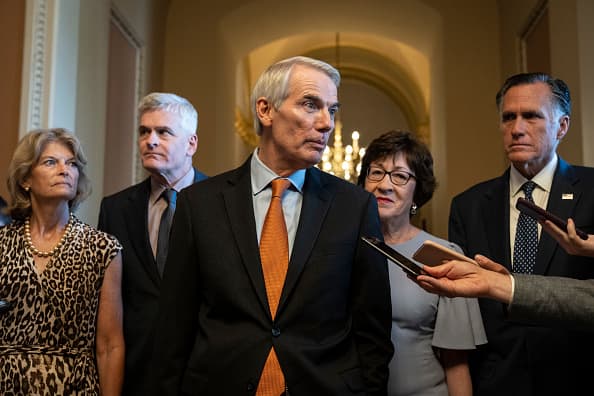
The lead GOP negotiators on the bipartisan infrastructure legislation, L-R, Sen. Lisa Murkowski (R-AK), Sen. Bill Cassidy (R-LA), Sen. Rob Portman (R-OH), Sen. Susan Collins (R-ME) and Sen. Mitt Romney (R-UT) speak to reporters after meeting privately with Senate Minority Leader Mitch McConnell (R-KY) at the U.S. Capitol on July 28, 2021 in Washington, DC.
Drew Angerer | Getty Images News | Getty Images
Key senators on Wednesday announced they reached a bipartisan infrastructure deal, but it was unclear if the plan had enough votes to pass as Majority Leader Chuck Schumer prepared to push it through the chamber.
“We now have an agreement on the major issues,” said Sen. Rob Portman of Ohio, the lead GOP negotiator. “We are prepared to move forward.”
The Democrat leading her party’s infrastructure effort, Sen. Kyrsten Sinema of Arizona, also said “we’ve got a deal” with “most” of the bill text completed, according to NBC News. She said she spoke to President Joe Biden, who is “excited to move this forward.”
Schumer, D-N.Y., said the chamber could hold a procedural vote to advance the plan as soon as Wednesday night. The measure will need 60 votes to advance, or 10 Republicans if all 50 members of the Democratic caucus back it.
Four other Republicans joined Portman in announcing the deal after they met with Senate Minority Leader Mitch McConnell, R-Ky. It was unclear how many more GOP senators were prepared to advance the plan.
The apparent agreement on infrastructure legislation follows disputes over issues including transit funding that prevented a deal for days. The wrangling threatened to derail a core piece of Biden’s agenda.
Senators “continue to make good progress” on both the bipartisan bill and Democrats’ separate plan to invest $3.5 trillion in social programs, Schumer said Wednesday. Democrats say both packages will boost the economy and provide a stronger safety net for households.
The infrastructure plan was expected to invest $579 billion in new money in transportation, broadband and utilities.
Schumer failed last week to start debate on the bipartisan plan. The Republican senators working on the bill with Democrats and the White House voted against advancing it as they tried to iron out disagreements.
The Democratic leader aims to pass the bipartisan plan and a budget resolution that would kickstart his party’s legislation before the Senate leaves Washington for its recess next month. Using budget reconciliation, Democrats can pass their bill without a Republican vote.
The bipartisan plan would need 60 votes to pass. It means at least 10 Republicans would have to back it if all Democrats sign off, or one more GOP senator would have to vote for it for every Democratic defection.
The vote to advance the bill would start a heavy lift for Democratic congressional leaders. They have to keep disparate wings of their party on board with both plans while navigating efforts by some Republicans to sink them.
House Speaker Nancy Pelosi, D-Calif., has stressed she will not take up either measure until the Senate passes both of them.
Democrats’ $3.5 trillion plan is expected to invest in child care, education, health care and efforts to curb climate change.




